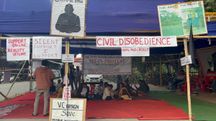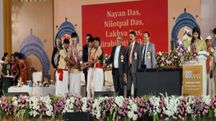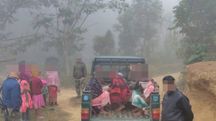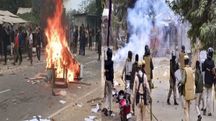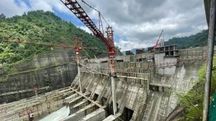Assam: 'Green Crackers' comparatively less harmful than normal crackers, says Pollution Control Board
The Pollution Control Board in Guwahati has issued a warning about the potential decline in air quality in the run-up to Diwali.
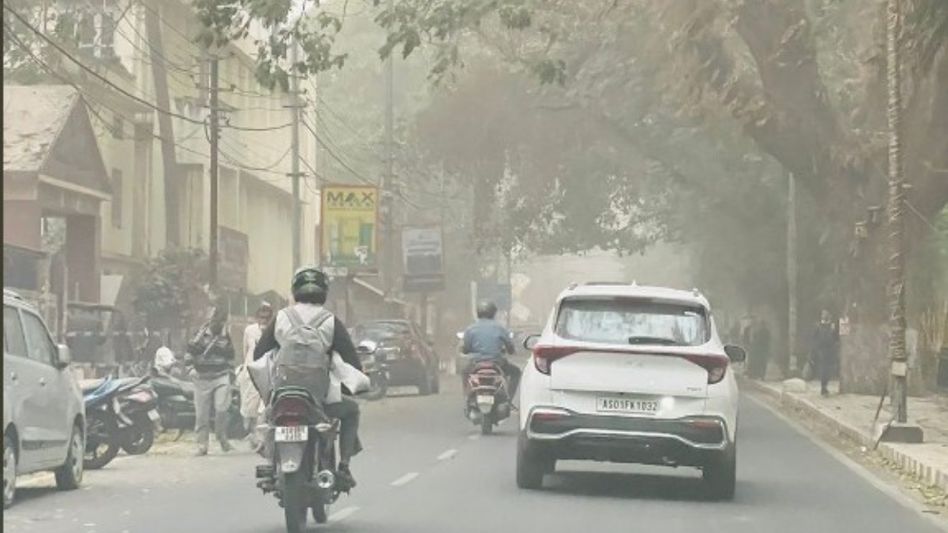 Representative Image
Representative ImageThe Pollution Control Board has issued a warning about the potential decline in air quality in the run-up to Diwali.
They are advocating for the use of 'green crackers' as an environmentally friendly alternative to traditional fireworks.
The board has urged the public to be mindful of the environmental impact of their celebrations and to consider the health risks associated with poor air quality.
Speaking to India Today NE, Manoj Saikia, Chief Environmental Scientist said, "In the past three decades we have noticed alarming consequences of air pollution due to crackers."
Also Read: Diwali 2023: What are 'green crackers'
Asserting the deteriorating air quality in Guwahati, Saikia said it is the result of particle matter in the air adding to the dry season which is lesser when compared to the rainy season.
"Now during the Diwali times or in the Durga puja visarjan or in fact in the dry season due to pollution from the vehicles and also felling of trees on the highway side have given rise to the particle matters," he added.
Speaking of firecrackers which have a chemical composition which consists of both metal and non-metal compounds, when these crackers are busted and the polluted smoke goes out to mix with air particles the quality detorates further.
"If such things happen the air quality dips from 'moderate' to 'poor' or 'very poor' and if the quality goes like what we are seeing in Delhi then it will be dangerous for people living here," he added.
Further, the PCB is now advocating the people of the state in accordance with Supreme Court guidelines to vouch for the bursting of green crackers as normal crackers contain 35- 50 per cent barium nitride which is an oxidizing agent and is regarded as poisonous for human organs.
Saikia said in the previous years the air quality dropped from “moderate” to “very poor” after Diwali. “Currently, the air quality in the city is in the ‘moderate’ range, in the moderate range itself people experience breathing difficulties. One can well imagine what the health hazards will be like if the air quality reaches the ‘poor’ stage,” Saikia added.
Also Read: Diwali 2023: Diyas Down The Ages
"In 2020 the concept of green crackers came into the picture which restricted the use of barium nitride in crackers and permitted the bursting of crackers between 8:00 PM- 10:00 PM as we have rituals of bursting crackers on Kali Puja and Diwali," Saika added.
However, raising concerns about the manufacturing 'green crackers', Saika pointed out that Tamil Nadu which is regarded as the biggest manufacturer of crackers and has around 18,000 units has earlier filed a petition in the Supreme Court seeking relaxation in the norms laid by the Apex court and minimize the use of barium nitride to at least 20 per cent, however, the Top court denied permission.
Saikia also raised concern that there might be a few places in the country where in the name of 'green crackers' the manufacturers are using barium nitride.
Speaking on the use of 'green crackers' Saika said, that in all crackers, there are environmental impacts but in India, we have to follow certain rituals and have to go by the evolution of crackers.
When asked about green crackers as an effective measure to tackle air pollution in the festive season, to this Saika said, "In green crackers also after bursting 30 per cent smoke comes that sucks the air but comparatively less harmful than the normal crackers."
Also Read: How To Care For Your Pets During Diwali
Measures taken by the Pollution Control Board
As per the guidelines of the Central Pollution Control Board, the state pollution board has stepped up its vigil of monitoring the air quality ahead of the festive season.
Notably on November 6, the board has already taken the AQI of Guwahati city and its surroundings in three zones- The residential zone, the Silent Zone and the Commercial Zone keeping the Industrial Zone separated as during festive seasons these units are normally closed.
The test was done in three zones- Ganeshguri, MMC Panbajar and Ulubari in Guwahati on November 6, 2023, and a similar test was also conducted all over Assam on the same day.
Further, a re-test will be done on November 19 to compare the AQI after the Diwali festival and again two days in between Diwali.
Ahead of Diwali, the pollution board has chosen three stations in Guwahati- Khanapara, Pandu and Birubari wherein continuous monitoring has been going on since November 6 for 15 days to look for heavy metal present in the air particles owing to its presence in crackers.
The same exercise will be conducted in Guwahati, Sibsagar and Silchar with a continuous 15 days of monitoring.
It is to be mentioned here that the stations measuring AQI in Assam have now gone up to 61 stations across the state including Majuli and Haflong and one will be set up in Kaziranga.
Sakia said after all the monitoring and comparing the quality of the air after the end of the festive season.
As an awareness programme, the Board has also launched posters/banner campaigns in the hot spots of the state wherein citizens are made aware of the use of 'green crackers' for a safe environment.
What is the district administration's instruction for Diwali
The state government has instructed all district administrations to restrict the bursting of crackers between 8 pm and 10 pm during the festive days, in addition to ensuring the sale of green crackers only.
Further, in Assam, only green crackers can be sold and bursting is allowed only for two hours during the Diwali festival.
There shall be a complete ban on bursting sound-emitting firecrackers between 10:00 PM and 8:00 AM.
On the otherhand, the bursting of crackers has been limited to - during Chatt Puja from 6:00 AM to 8:00 AM and during Christmas and New Year evenings from 11:55 PM to 12:30 AM.
The manufacture/sale or use of firecrackers generating noise levels exceeding 125 dB(AI) or 145 dB(C) pk at a 4-meter distance from points of bursting shall be prohibited.
This was announced via a notification signed by Diganta Barah, Commissioner of Police, Guwahati.
Guwahati Municipal Corporation's (GMC) diktat on Diwali
The Guwahati Municipal Corporation (GMC) has made an appeal to the people of the city to properly dispose of banana trees used during Diwali celebrations.
Taking to social media platform X, the GMC authorities asked the shopkeepers, puja pandal committees and common citizens not to toss banana trees on streets and instead appealed to dispose of the banana trees in GMC garbage cans.
“Don't toss the banana trees on the streets. Call GMC on our helpline number, and we'll pick them up! Whether they're unsold or used, we'll ensure proper disposal. Let's light up the city without littering it. Together, we can make a difference!” said GMC in the X post.
Copyright©2025 Living Media India Limited. For reprint rights: Syndications Today

